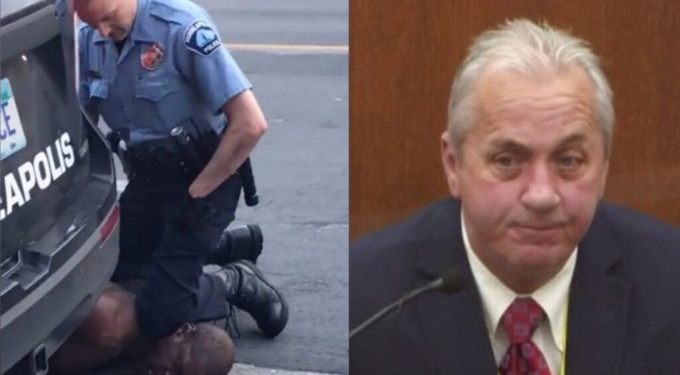
By
The head of the Minneapolis Police Department’s homicide division flatly denounced former officer Derek Chauvin’s use of force against George Floyd as “totally unnecessary.”
Lt. Richard Zimmerman testified on Friday about his over three decades of police training and the lethal dangers of the techniques used on Floyd on May 25, 2020.
Chauvin, a white former Minneapolis police officer, is currently facing trial for his role in the killing of Floyd, 46, a Black man, by pressing his knee into Floyd’s neck for over nine minutes as he lay handcuffed on the ground.
“Once you handcuff a person you need to get them out of the prone position as quickly as possible because it restricts their breathing,” Zimmerman said, adding that being handcuffed “stretches the muscles back through your chest and it makes it more difficult to breathe.”
“That would be the top tier, the deadly force,” he said, noting that escalating to such a degree goes against use-of-force training at MPD. “Because if your knee is on someone’s neck, that can kill them.”
When asked if such force was necessary, Zimmerman responded that it was “totally unnecessary” given that any potential threat from Floyd had been subdued.
“First of all, pulling him down to the ground facedown and putting your knee on the neck for that amount of time is just uncalled for,” Zimmerman said. “I saw no reason why the officers felt they were in danger if that’s what they felt. And that’s what they would have to feel to use that type of force.”
Continuing, Zimmerman noted that handcuffing a person quickly alters the permissible use of force that can be used in a situation.
“Once a person is cuffed, the threat level goes down all the way to, they’re cuffed, how can they really hurt you?” he said. “That person is handcuffed, and the threat level is just not there.”
At that stage, the use of force quickly declines, he added.
“If they become less combative, you may just have them sit down on the curb,” Zimmerman said. “The idea is to calm the person down and if they are not a threat to you at that point, you try to, you know, to help them so that they’re not as upset as they may have been in the beginning.”
Derek Chauvin has faced at least eighteen complaints during his 19-year career with the Minneapolis police, including six times in which prosecutors claim the former officer used force against arrestees.
However, these incidents – like George Floyd’s own criminal record – won’t be introduced to jurors in the Chauvin trial so that the defendant isn’t punished for prior misconduct, and is instead evaluated on the charges he faces for the death of Floyd: third- and second-degree murder and second-degree manslaughter.





![Everything You Ever Wanted to Know About 9/11 Conspiracy Theory in Under 5 Minutes [VIDEO] | by James Corbett](https://consciouslifenews.com/wp-content/uploads/2018/09/911-a-conspiracy-theory-350x250.jpg)










